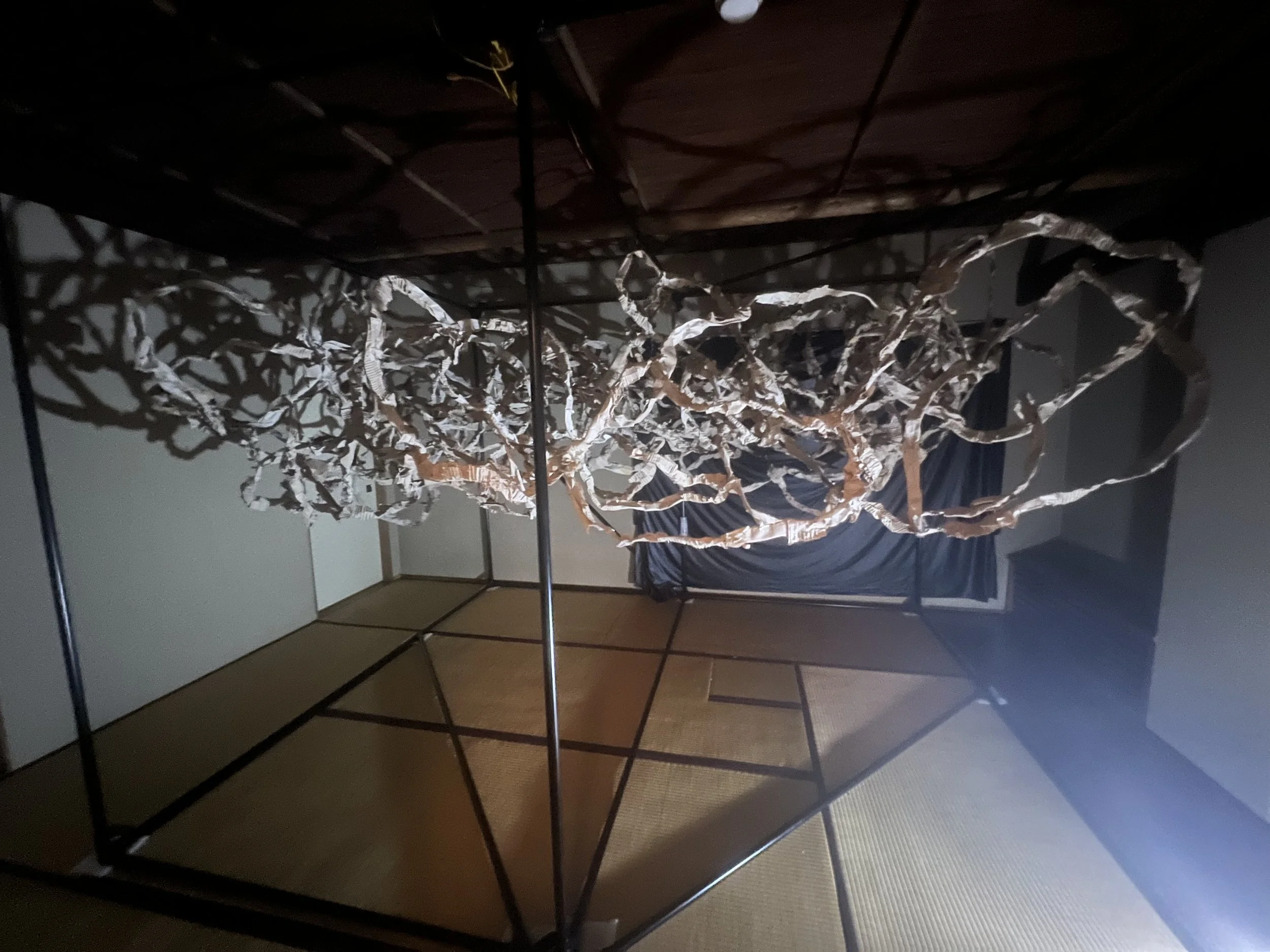Embodiment and emergence: ALIFE 2023 - Day 3
“Qualified Trace Candidate Turn,” a sculpture by Yukio-Pegio Gunji. “The world is made by those who are both man and insect,” Gunji wrote, “and is made of the trace of neither man nor insect.”
It might surprise people that artificial life ("Alife") is not a new field – it has deep roots in evolutionary biology, information science, computer engineering, psychology, and art. Alife blends the fanciful with the practical – looming sculptures of wiggling network interactions alongside urgent warnings about how *not* to train humans how to use AIs. To solve the world's toughest problems, it's probably good to start by understanding what makes us 1) intelligent or 2) alive.
“If you’re interested enough in the universe, then s*** happens.”
Current AI models weren't subjected to the same evolutionary pressure as humans or other animals. That means they did not learn how to share as humans do in kindergarten. Collective intelligence (CI) in humans emerged over time as we learned to cooperate, compete, and use resources efficiently. Several folks here at ALIFE 2023 are tinkering with new ways of training AI models to make them more "like us" in that way, which could improve our ability to understand and control them.
Three Key Insights
Embodiment
If you talk to folks in Alife, CI, or AI long enough, you'll hear them talk about "embodiment." Embodiment is the idea that intelligence can't exist in a vacuum but is deeply tied to the agent's physical, social, and informational relationships with its environment. One aspect of embodiment is social ontogeny – becoming a social agent. In ways we don't fully understand yet, social ontogenies develop in relationship to the physical memories in our bodies. (If I'm misunderstanding this, please correct me!)
The more complex the topic, the more important to keep a sense of humor.
Coexistence
Our best analogy to learn about human-AI interaction is to explore how other species coexist (or fail to coexist) in shared environments. Environments constantly seek a stable equilibrium, which can be hard to find if multiple species interact dynamically. Predation and symbiosis aren't the only options; sometimes, species experience "differential survival," in which they rely on each other in ways that Darwinian competition does not explain.
Symbiosis
One symbiosis is how we can use AI to study the brain and use our understanding of the brain to design AIs better. Think of our senses – sight, sound, smell, touch. But our brains are registering so much more information from our environments than we can monitor consciously! New animal studies suggest that we might be able to learn, using an AI-powered implant, how to monitor and adjust our heart rate, stress response, and other bodily responses. This data could be used to improve AI awareness of how humans work and how to interact with us more effectively! (Like many people, trusting someone enough to put a chip in my head would take a lot. But if that trust can be earned, the possibilities are endless.)
Three Faces of ALIFE
Abootaleb Safdari Sharabiani is an Iranian philosopher of technology whose work focuses on the phenomenology of perception – which means, essentially, that what we perceive is closely tied to our embodied experiences. Technology, then, is not something external but core to how we perceive the world.
Emily Dolson, assistant professor of computer science at Michigan State University, uses digital systems to study how ecologies can evolve. She explores the processes that make diversity possible in an environment and how to protect them.
The picture of an ALIFE 2023 organizer’s desk - books by Ted Chiang, swag, and hefty amounts of caffeine.
The Alife field promises to understand how coordinated behaviors can emerge from dynamic, complex environments; this frequently requires drawing insights from digital simulations, biology, and beyond. Award-winning informatics and computer science scholar Randall Beer studies these intersections, including how ephemeral digital agents can begin to cooperate.
Two Sessions I Enjoyed
Amidst stiff competition, the most interesting session at ALIFE 2023 to date has been Yuji Ikegaya's keynote, "AI-Assisted Brain Enhancement." It was Yuji's research that I referenced above – through an impressive combination of material science, machine learning, and biology, he successfully implanted chips in rats' brains to rapidly improve learning across a variety of tasks, from changing the lights in their cages to recognizing the difference between English and Spanish.
Shooting my shot at academic karaoke.
ALIFE gathered early-career researchers into a workshop called "Emerging Researchers in Artificial Life," where we learned from bright minds in the field (including some undergraduate students whose work blew me away.) The best part came at the end – Academic Karaoke, where we took turns delivering presentations for insane slides we'd never seen before. I was hungry and worn down from jet lag, but I threw my name in the hat anyway! Wound up giving a RIVETING talk about Roombas. It was hilarious!
Looking forward to tomorrow
Taken in Otaru, a seaside town nearby Sapporo, and the only “tourist” activity I’ve done so far.
We've gone deep into our subject matter the past several days but haven't gotten out to explore Sapporo, our host city. Tomorrow, everyone looks forward to our group excursion to see the art, architecture, and natural diversity that make this city a perfect home for ALIFE 2023!




